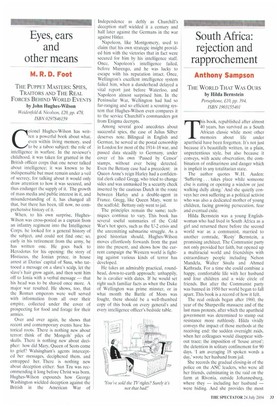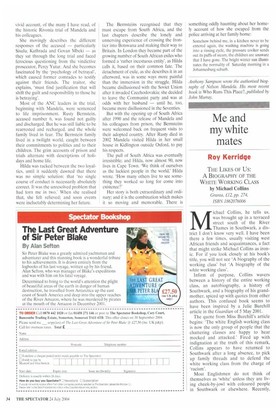South Africa: rejection and rapprochement
Anthony Sampson
THE WORLD THAT WAS OURS by Hilda Bernstein Persephone, £10, pp. 394, ISBN 1903155401 This book, republished after almost 40 years, has survived as a South African classic while most other
memoirs about life under apartheid have been forgotten. It's not just because it's beautifully written, in a plain, unpretentious style, but also because it conveys, with acute observation, the combination of ordinariness and danger which is implicit in any totalitarian state.
The author quotes W. H. Auden: 'Suffering. . . takes place while someone else is eating or opening a window or just walking dully along.' And she quietly conveys her own suffering as a political activist who was also a dedicated mother of young children, facing growing persecution, fear and eventual exile.
Hilda Bernstein was a young Englishwoman who had lived in South Africa as a girl and returned there before the second world war as a communist, married to another comrade, 'Rusty' Bernstein, a promising architect. The Communist party not only provided her faith, but opened up a multiracial world and friendships with extraordinary people including Nelson Mandela, Walter Sisulu and Ahmed Kathrada. For a time she could combine a happy, comfortable life with her husband and four children and a wide circle of friends. But after the Communist party was banned in 1950 her world began to fall apart. This book is a record of how it felt.
The real ordeals began after 1960, the year of the Sharpeville massacre and of the last mass protests, after which the apartheid government was determined to stamp out resistance more ruthlessly. Hilda vividly conveys the impact of those methods at the receiving end: the sudden overnight raids, when her colleagues would disappear without trace; the imposition of 'house arrest'; the detention in solitary confinement for 90 days. 'I am averaging 18 spoken words a day,' wrote her husband from jail.
She records the gradual closing-in of the police on the ANC leaders, who were all her friends, culminating in the raid on the farm at Rivonia, outside Johannesburg, where they — including her husband — were hiding. And she provides the most vivid account, of the many I have read, of the historic Rivonia trial of Mandela and his colleagues. She movingly describes the different responses of the accused — particularly Sisulu, Kathrada and Govan Mbeki — as they sat through the long trial and faced ferocious questioning from the vindictive prosecutor, Percy Yutar. And she becomes fascinated by the 'psychology of betrayal', which caused former comrades to testify against their friends. The traitor, she explains, 'must find justification that will shift the guilt and responsibility to those he is betraying'. Most of the ANC leaders in the trial. beginning with Mandela, were sentenced to life imprisonment. Rusty Bernstein, accused number 6, was found not guilty and discharged. But he was still liable to be rearrested and recharged, and the whole family lived in fear. The Bernstein family lived in a twilight world, caught between their commitments to politics and to their children. The grim accounts of prison and trials alternate with descriptions of holidays and home life. Hilda was racked between the two loyalties, until it suddenly dawned that there was no simple solution: that 'no single course of conduct is necessarily absolutely correct. It was the unresolved problem that had torn me in two.' When she realised that, she felt relieved; and soon events were ineluctably determining her future. The Bernsteins recognised that they must escape from South Africa, and the last chapters describe the lonely and unnerving experience of crossing the frontier into Botswana and making their way to Britain. In London they became part of the growing number of South African exiles who formed a 'rather incestuous entity', as Hilda calls it, based on their common fate. The detachment of exile, as she describes it in an afterword, was in some ways more painful than the immersion in the struggle. Hilda became disillusioned with the Soviet Union after it invaded Czechoslovakia; she decided to leave the Communist party and was at odds with her husband — until he, too, became more disillusioned in the Seventies.
But with the opening up of South Africa after 1990 and the release of Mandela and his colleagues from prison, the Bemsteins were welcomed back on frequent visits to their adopted country. After Rusty died in 2002 Mandela visited Hilda in her small house in Kidlington outside Oxford, to pay his respects. The pull of South Africa was eventually irresistible; and Hilda, now almost 90, now lives in Cape Town. 'We think of ourselves as the luckiest people in the world,' Hilda wrote. 'How many others live to see something they worked so long for come into existence?'
Her story is both extraordinary and ordinary; and it is the combination which makes it so moving and memorable. There is something oddly haunting about her homely account of how she escaped from the police arriving at her family home:
Somehow behind me, in a kitchen never to be entered again, the washing machine is going into a rinsing cycle, the pressure cooker sends out its puffs of steam, the children are unaware that I have gone. The bright winter sun illuminates the normality of Saturday morning in a Johannesburg suburb.
Anthony Sampson wrote the authorised biography of Nelson Mandela. His most recent book is Who Runs This Place?, published by John Murray.
INNI■mmial



























































 Previous page
Previous page